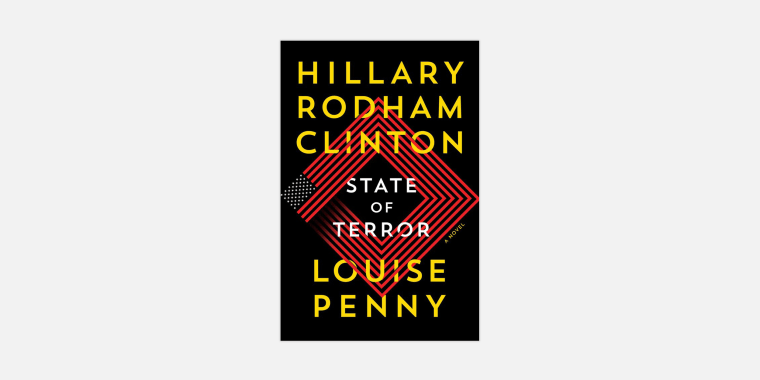Already the author of three weighty memoirs, former Secretary of State Hillary Clinton released her first novel Tuesday. Titled "State of Terror," the book was co-written with bestselling author Louise Penny and centers around a secretary of state and her rival, the president who hand-selected her. Clinton is said to be siphoning from real-life experience and would-be catastrophes to inform the work: The ongoing threat of terrorism and various complications in the Middle East and Central Asia are clearly superimposed from Clinton's life both in and out of office.
The moment her debut work of fiction was published, Clinton became one of the most famous novelists in the world, with meteoric reach in peddling nearly 500 pages that reimagine her public persona.
Clinton's new book is just the most recent example of a powerful leader who has exercised the privilege to tweak and prune her own history with a subversiveness via fiction not otherwise enjoyed on the paid lecture and earned media circuit. The moment her debut work of fiction was published, Clinton became one of the most famous novelists in the world, with meteoric reach in peddling nearly 500 pages that reimagine her public persona.
Global political figures have always had many tools and deep resources at their disposal to craft their personal image and deploy PR rehabilitation strategies in the face of a drop in public regard. While there is precedent for politicians dabbling in both literature and art, the hypervisibility of the contemporary era allows for these hobbies to become another tool in the approval-ratings arsenal, cheapening both them and their mediums.
Clinton’s own husband, former President Bill Clinton, led the charge when he tapped James Patterson to help write his book, 2018's "The President Is Missing," and more recently, "The President's Daughter." This is in addition to literature by other politicians of note: Stacey Abrams, Jimmy Carter and Newt Gingrich among them. On the visual side of the spectrum, later-in-life painters George W. Bush and Hunter Biden became two of the most well-known artists of all time overnight. The gang's all here.
As with these other allegedly artistic pursuits, a release like "State of Terror" transcends literature itself. The issue of quality is lost in the fog of a predetermined commerce. An assumed financial success, the writing is the least vital component. That's not to assume it's bad, although conservative talk radio will likely have its hands — and mouths — full this week.
A more interesting phenomenon than the prospect of a decent autumn read is at stake here. In this case, another take on real-world events by one of its key players is offered, but it uses the bulletproof shield of fiction to add theater and murk to what are possibly deeply held beliefs that may seem vulgar to express otherwise. It's the ventriloquist's dummy who doesn't appreciate your haircut; the ventriloquist remains innocent.
One wonders how much these projects are driven by wanting to set the record straight — as they see it — by those who have had to read what everyone else thinks about them for so long. To use a completely inverse example, one of the most interesting finds in the forensic breakdown of Osama bin Laden's compound — an event that Clinton was very much a significant witness to and that no doubt haunts this novel — was that the terrorist leader read conspiratorial journalism about his own life. That the key figure in the Sept. 11 attacks read junk theory about his own plot gives insight into the extent to which various figures in the war on terror monitored their own daily clippings.
Clinton’s book also seems to serve as further therapy to remove the sting of her 2016 loss to Donald Trump. According to The Associated Press, "Clinton says the ‘ego-driven and uninformed’ President Dunn (as he’s described in the book) is and is not Trump." Meanwhile, President Dunn's more thoughtful successor, President Williams, seems to represent a bizarro Barack Obama.
According to what the publicity department at St. Martin's Press told me, People magazine was the only publication that receivedan exclusive excerpt of the novel before Tuesday’s public release. Not the Los Angeles Review of Books or the Paris Review. The publishing house itself made no secret that this was a name-forward release. The excerpt was light on content and made it difficult to draw a fully formed opinion on the content beyond the brief character sketches.
Penny and Clinton seem to be legitimate friends who enjoyed writing a book together, but is it fair to mass-produce the vanity projects of political figures, whether or not they are currently in power? Has the planet not endured enough news and material consequences of their collective policies, good or bad, beneficial or not? Why must the reading public also become pawns in the hybrid fantasies of the powers who move them at will?
The potential danger of propaganda looms over "State of Terror" as well. Kathryn Bigelow's 2012 film "Zero Dark Thirty" has been endlessly debated for the ethical aspects of blurring the lines between facts and beyond, as well as being perhaps a bit too reliant on the intelligence community as its tour guide, and there is a similar risk here. Compiling the list of fan fiction surrounding American military triumphs — and the mix of heads of state, authors and Hollywood directors who have produced it — results in a staggering body of work before you add in authors who actually were part of those military adventures.
Clinton herself has seemed torn on the issue of historical revisionism. Speaking on the Vietnam War in her memoir "Living History," she tellingly wrote, "In fact, there are some people who would like to rewrite history to erase the legacy of the war and the social upheaval it spawned." Now that sounds like reality.


